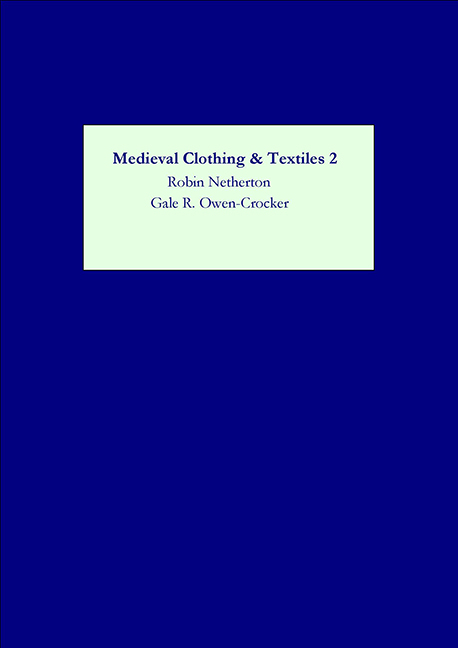Book contents
- Frontmatter
- Contents
- Illustrations page
- Tables
- Contributors
- Preface
- 1 Dress and Accessories in the Early Irish Tale 'The Wooing Of Becfhola”
- 2 The Embroidered Word: Text in the Bayeux Tapestry
- 3 “De Fil d'Or et de Soie”: Making Textiles in Twelfth-Century French Romance
- 4 Biffes, Tiretaines, and Aumonières: The Role of Paris in the International Textile Markets of the Thirteenth and Fourteenth Centuries
- 5 'Clothing Themselves in Acres”: Apparel and Impoverishment in Medieval and Early Modern England
- 6 'Ye Shall Have It Cleane”: Textile Cleaning Techniques in Renaissance Europe
- 7 Fleas, Fur, and Fashion: Zibellini as Luxury Accessories of the Renaissance
- 8 The Matron Goes to the Masque: The Dual Identity of the English Embroidered Jacket
- Recent Books of Interest
- Index
5 - 'Clothing Themselves in Acres”: Apparel and Impoverishment in Medieval and Early Modern England
Published online by Cambridge University Press: 14 February 2019
- Frontmatter
- Contents
- Illustrations page
- Tables
- Contributors
- Preface
- 1 Dress and Accessories in the Early Irish Tale 'The Wooing Of Becfhola”
- 2 The Embroidered Word: Text in the Bayeux Tapestry
- 3 “De Fil d'Or et de Soie”: Making Textiles in Twelfth-Century French Romance
- 4 Biffes, Tiretaines, and Aumonières: The Role of Paris in the International Textile Markets of the Thirteenth and Fourteenth Centuries
- 5 'Clothing Themselves in Acres”: Apparel and Impoverishment in Medieval and Early Modern England
- 6 'Ye Shall Have It Cleane”: Textile Cleaning Techniques in Renaissance Europe
- 7 Fleas, Fur, and Fashion: Zibellini as Luxury Accessories of the Renaissance
- 8 The Matron Goes to the Masque: The Dual Identity of the English Embroidered Jacket
- Recent Books of Interest
- Index
Summary
In London, the rich disdaine the poore. The Courtier the Citizen. The Citizen the Countriman. One Occupation disdaineth another. The Merchant the Retayler. The Retayler the Craftsman. The better sort of Craftsmen the baser. The Shoomaker the Cobler. The Cobler the Carman.
As he pontificates against the sin of disdain in his Christ's Teares Over Jerusalem, first published in 1593, Thomas Nash offers us an illustration of status groups in early modern London, and his opinion of the contention between and among the groups. The groups were differentiated from one another by such characteristics as dialect and deportment, but the most accessible signifier of status in early modern English society was clothing.
Most students of medieval and early modern culture are aware that a body of legal and social texts assigned precise signifiers to various items of apparel with the goal of rendering an individual recognizable to society-at-large. These diverse texts fixed clothing as a mark of social and occupational status.
This essay will examine some of these texts in an attempt to determine how apparel was utilized in that society, both by those who sought to manipulate others through sartorial signifiers, and by those who endeavored to manipulate their own status through apparel. By focusing on one of the articulated rationales for apparel mandates, I will also demonstrate, in contrast to other scholarly speculations, that attitudes about apparel directives did not differ significantly from the medieval to the early modern period in England.
My title derives from the complaint of the protagonist in Thomas Middleton's satirical pamphlet The Ant and the Nightingale: or, Father Hubburd's Tales, who says that the merchants catering to his landlord's sartorial extravagance are “clothing themselves in acres”—in other words, depriving the landlord, his family, and their tenants of their livelihoods. Middleton treats with mordant humor the quite critical concern of early modern society with the decline of charity, and its purported replacement with high fashion. We can locate this threading of clothes and charity in the most conspicuous type of clothing text, apparel laws, as well as in texts that echo the laws; therefore, we will first examine the laws' assertion that apparel mandates were necessary to prevent the impoverishment of the realm.
- Type
- Chapter
- Information
- Medieval Clothing and Textiles 2 , pp. 91 - 100Publisher: Boydell & BrewerPrint publication year: 2006

